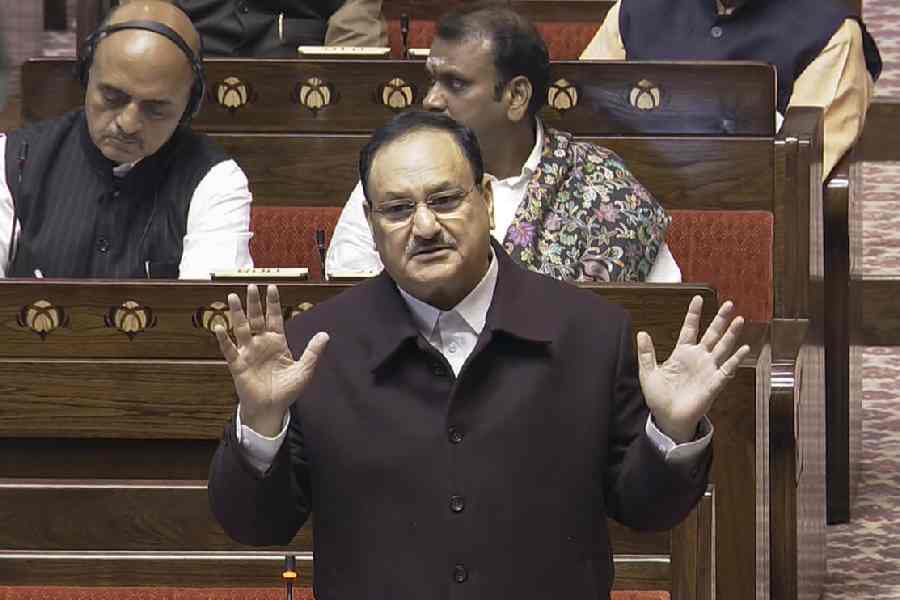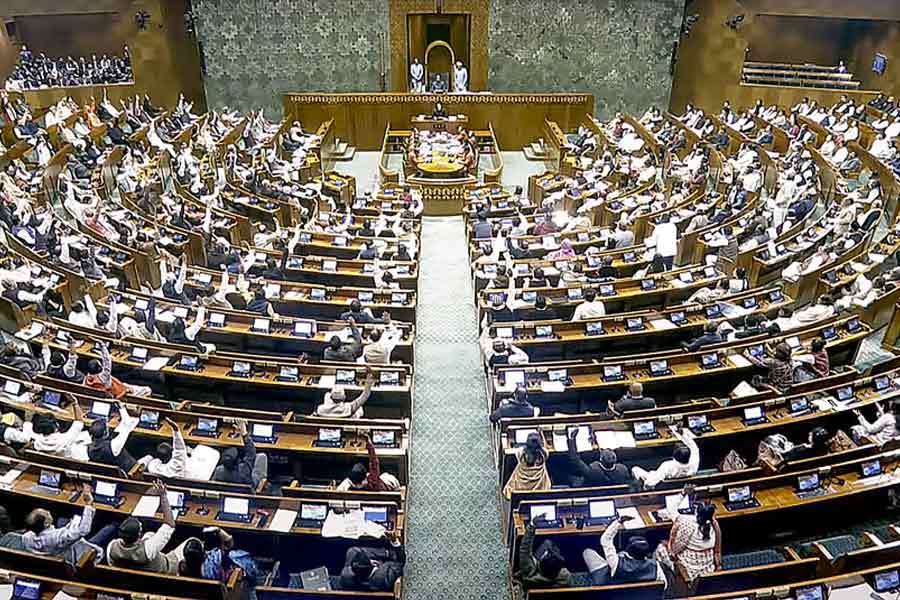Rajya Sabha Leader of the House J P Nadda attacked the Congress on Tuesday for amending the Constitution for its own benefit and alleged that its past actions of "toppling governments" in states led to staggered polls, creating the necessity for 'One Nation One Election' bill.
Participating in a debate in the Upper House on the "Glorious Journey of 75 Years of the Constitution of India", the BJP president accused the Congress of practising politics of appeasement and attempting to bring in religion-based reservations, a charge which was vociferously contested by the opposition party.
The BJP president also spoke about the Emergency, rejecting the Congress' claim of having apologised for it. Nadda said if the Congress regrets the step, it should join in observing 'Samvidhan Hatya Divas' on June 25 next year, the 50th anniversary of the imposition of the Emergency.
The BJP leader quoted B R Ambedkar to say "however good a Constitution may be, if those who are implementing it are not good, it will prove to be bad", and added that the "bad lot has interfered with the Constitution many times".
On a day when two bills that lay down the mechanism to hold simultaneous elections were introduced in the Lok Sabha after a fiery debate, Nadda blamed the Congress for creating a situation that forced the government to take this step.
"We have to bring the One Nation One Election bill because you toppled elected government in states, and elections had to be held," Nadda said.
The first general elections to the Lok Sabha and state assemblies were held together in 1951-52, a practice that continued for three subsequent general elections in 1957, 1962, and 1967.
Nadda targeted the Congress over issues ranging from Article 370 to triple talaq, and also accused it of not protecting the territorial integrity of the country.
Accusing the Congress of "minority appeasement", Nadda said, "You called Rajiv Gandhi progressive... The Supreme Court gave a decision in the Shah Bano case, under pressure from Muslim clergies, you brought an amendment in Parliament. It was done keeping vote bank politics in mind." "The Supreme Court always said triple talaq should go, you did not have courage, you were doing appeasement politics," he said.
Nadda also accused the Congress of trying to bring in reservation based on religion.
The Leader of the House said Ambedkar had clearly said that reservation should not be structured in the name of religion.
"In Andhra Pradesh and Telangana, you (Congress) attempted to provide (religious minority) reservation under backward classes, which was struck down by the high court," Nadda said.
Subsequently, he aleged,0 the then Congress-led government at the Centre came out with a circular issued by the DoPT calling for inclusion of 4.5 per cent Muslim minorities in the 27 per cent reservation for backward classes, which was quashed by the Supreme Court.
"The country should know how you (Congress) are attempting to misconstrue what is there in the Constitution for the sake of appeasement politics," he said.
His remarks were objected to by Congress leader Jairam Ramesh, who raised the issue of reservation given by the Gujarat Government.
Coming to Nadda's defence, Union Minister Nirmala Sitharaman said, "What Jairam Ramesh is saying now is wrong. What the Gujarat chief minister gave was on the basis of economic backwardness. Here it is mentioned religious minorities," she said, referring to a circular purportedly issued by the DoPT under the then Congress-led government.
She added that Ramesh is conflicting the two (reservations given by the Gujarat government and the DoPT circular) and misleading the House.
BJP MP K Laxman who heads the party's OBC Morcha backed Sitharaman's claim.
Countering Sitharaman, Ramesh said, "We (Congress) have never spoken about religion-based reservation", adding that wherever reservation has been given like in Karnataka it is on the basis of being socially and economically backward not on the basis of religion.
Sitharaman responded to Ramesh, saying that he may come up with any number of clarifications but he is misleading the House on this point.
Nadda said Congress leaders are saying they have apologised for the Emergency, but "how do we believe this"? The 50th anniversary of the Emergency is next year, he reminded the House.
The government declared June 25 as "Samvidhaan Hatya Diwas", the day the Emergency was imposed in 1975 by then Prime Minister Indira Gandhi.
"We invite the Indian National Congress to join us (in observing the day," Nadda said "There was an attempt to murder democracy... if there is any regret in their hearts, I invite you to join us on June 25, 2025," Nadda said.
Mentioning Article 370, which was abrogated in 2019, the BJP president blamed former prime minister Jawaharlal Nehru and the Congress for bringing it in the first place.
"After the bad lot, we got the good lot. On August 5, 2019, we abrogated Article 370... I once again congratulate the PM. Because of his wisdom, Jammu and Kashmir is an inseparable part of India now." "Congress has neither been protecting India's sovereignty, nor combating efforts to reduce India's influence in its neighbourhood," Nadda alleged.
He also mentioned India accepting Katchatheevu island being a part of Sri Lankan territory. DMK MP Tiruchi Siva intervened and clarified that his party, which was in power in Tamil Nadu when the decision was made in 1974, had passed a resolution against the decision.
"It is time to rethink association with Indian National Congress also," Nadda said.
He also claimed that Ambedkar, during the debates of the Constituent Assembly, had said there was no need to include the words 'secular' and 'socialist' in the Preamble of the Constitution.
Except for the headline, this story has not been edited by The Telegraph Online staff and has been published from a syndicated feed.











